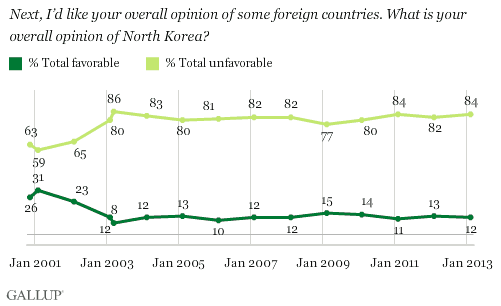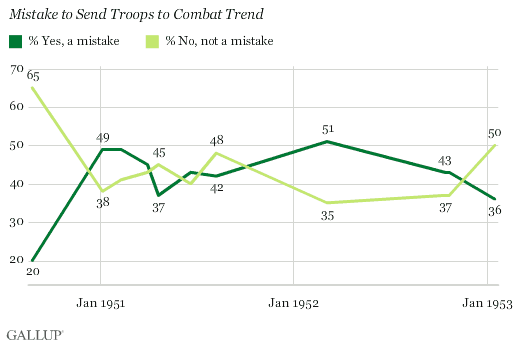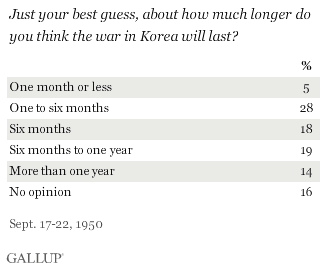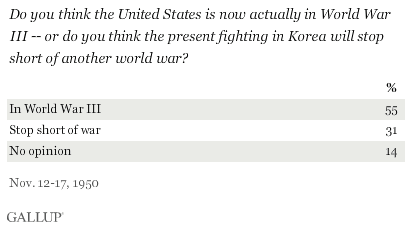As we recently reported, a snapshot of American public opinion last week showed that the majority of Americans favor the U.S. coming to the aid of South Korea should North Korea decide to invade again -- as it did in 1950. This comes as no surprise in a general sense, given the evidence showing that a) most Americans have an unfavorable opinion of North Korea, and b) most Americans are worried about North Korea as a threat.
Here's the trend on views toward foreign countries, including North Korea. I'm not sure who the 12% of Americans are who say they have a favorable opinion of North Korea, but it's possible there is some confusion between the two countries occupying the Korean peninsula. One modestly surprising finding is the slightly more positive view of North Korea held by Americans back in early 2001.

Below is the table showing that 83% of Americans perceive the development of nuclear weapons by North Korea as a "critical" threat, about the same as say this about the development of nuclear weapons by Iran, another not-very-favorably viewed country. This, too, may help explain why Americans would be willing to come to the aid of South Korea.

Of course, this country has a history of coming to the aid of South Korea. Only Americans who are about 75 years and older will remember the Korean War directly, but others may have been introduced to that war by Robert Altman's movie M.A.S.H. or the popular TV show of the same name, which spun off of the movie (the movie itself came from the excellent novel by Richard Hooker, a pseudonym for a doctor who served in Korea).
A review of public opinion data from the Korean War era shows that, as is usually the case when the U.S. gets into a war, initial reaction to the U.S. intervention in Korea in 1950 was positive, with only 20% saying it was a "mistake" to send U.S. troops there. That opinion soured pretty quickly. By early 1951, almost half said it was a mistake. Opinions varied from that point on, and by early 1953, with both sides of the conflict continuing at that point to meet at the negotiation table in an effort to hammer out a peace agreement, the mistake percentage was down to 36%.

We did ask this mistake question one more time, in 2000, and found a similar response, with 34% saying it was a mistake and 47% saying it was not. This more positive attitude may too help explain why Americans are positive now about helping South Korea in the eventuality that North Korea invades. If it worked the first time, it can work again.
I came across another fascinating finding about the Korean war. When Gallup interviewed Americans in September 1950, just a few months after the U.S. had become involved, about seven in 10 Americans were convinced that the war would be over within a year or so. Only 14% said that it would last more than a year (the rest had no opinion, which was probably the most rational response).

In fact, it wasn't until the summer of 1953, of course, before the peace agreement was signed. And by that time well over 30,000 Americans had died in combat, along with estimates of millions of deaths of Koreans, Chinese, and soldiers from other countries that got involved. The disparity between expectations of a quick war and the reality of a protracted war may have been one of the reasons why Americans became less positive about it as it went on.
One other very interesting finding. Over half of Americans in November 1950 thought that the U.S. was now involved in "World War III."

Of course, there isn't any official definition of what constitutes a "world" war is as opposed to other wars, but certainly Korea never opened up to be the same type of global conflict as World War II -- with fighting that was taking place in multiple points around the globe at once. The World War II conflict stretched from the China-Burma-India theater eastward across Southeast Asia, throughout the vast western and southwestern Pacific, and across most of Europe, the Mediterranean region, and Russia. The Korean War involved a number of different nations, but was confined to the relatively small Korean peninsula.
